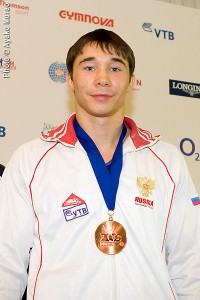In the case of Dong Fangxiao…
Last week the Fédération Internationale de Gymnastique made its announcement: Dong Fangxiao will have her individual Olympic results from Sydney 2000 nullified (the FIG has yet to rule on the team bronze won by China). She was found to be 14-years-old at the 2000 Olympic Games, two years short of the age requirement of 16. Teammate Yang Yun, who later admitted she was also only 14 at the time, will retain her bronze medal on bars, due to insufficient proof that she was underage.
Dong Fangxiao, 2000 Olympic Games, NBC Fluff
Dong Fangxiao, 2000 Olympic Games, Floor Exercise
This scandal is the third in a string of blemishes marking the women’s competition in Sydney. The all-around was marred first by the vault setting error, and then by all-around champion Andreea Raducan’s positive test for pseudoephedrine (no longer a banned substance).
Cheaters do need to be punished, but what is the appropriate punishment in this case? Is this really fair to strip Dong and her teammates of their medal when she was just a young gymnast who likely played no role in the deceit? And 10 years later, it’s hardly fair to punish the new generation of gymnasts by banning them from FIG competitions, as happened to North Korea in the early 1990s. (Then again, that’s not to say that this kind of cheating is a thing of the past…we all know of the controversy surrounding He Kexin and Deng Linlin at the 2008 Olympic Games!)
And what about all the other gymnasts who have later admitted to being underage at major competitions? If Dong and Yang’s cases were only investigated because they fell in the 10-year time frame, does that not seem a bit arbitrary? What about looking into the real birth dates of other gymnasts who have admitted being underage, most notably Romanians stars Gina Gogean, Sabina Cojocar, Alexandra Marinescu, Daniela Silivas and Ecaterina Szabo? (I find it amusing that Bela Karolyi was one of the most vocal critics during the age controversy in Beijing!)
A Brief History of Underage Gymnastics
Unfortunately, it’s the countries that play by the rules who suffer most when others cheat. Canada had some wonderful junior gymnasts in 2008 (most notably Charlotte Mackie, Peng Peng Lee and Brittany Rogers) and along with Elyse Hopfner-Hibbs, Kristina Vaculik and Nansy Damianova, we most likely would have qualified a full team to the Olympics had they been allowed to contribute routines at the qualifying World Championships the year before.
Perhaps the best solution is a proactive one: birth dates for gymnasts should be checked carefully by the FIG before they start competing internationally, and national federations should be warned that there will be more severe sanctions should they try to cheat.
Part of me thinks there shouldn’t be an age limit at all, thus eliminating this dilemma, but I acknowledge the importance of protecting young children from the pressures of international competition. Raising the age limit from 15 to 16, as the FIG did in 1997, might have actually increased the incidence of cheating since many female gymnasts are often in top form well before age 16.
I feel sorry for Dong Fangxiao since she is embroiled in this mess that she surely didn’t create. It’s also a shame that her career was cut short due to her hip dysplasia. Stay tuned for the FIG’s ruling on China’s team bronze medal….


